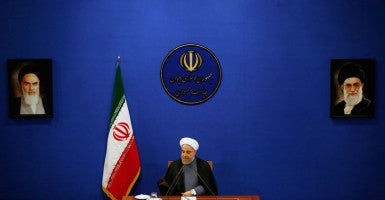The Obama administration has just allowed a stated enemy of the United States to have the capability to enrich uranium.
As part of the Iran nuclear deal, the administration is allowing Iran to operate over 5,000 centrifuges and undertake an enrichment research and development program.
This alone is bad enough given that these are extremely useful components for a nuclear weapons program.
Interestingly, and seemingly forgotten, is that this is the very same technology that South Korea, an American ally, wanted to develop as part of its commercial nuclear program.
The administration will surely argue that the two agreements are apples and oranges and not worthy of comparison.
But they are worth comparing and here is why.
Underlying both agreements is America’s effort to prevent the spread of nuclear weapons.
The administration justified the outcomes of each case based on what it argued where its nonproliferation objectives.
Despite this, the difference in how each case was handled could not be more dissimilar.
An American Ally Snubbed: South Korea
South Korea has a long history as a close American ally and continues to play a critical international non-proliferation role as a growing participant in commercial nuclear power.
The South Koreans have been a faithful partner in international and regional non-proliferation agreements despite an aggressive neighbor in North Korea. In fact, the current administration has called them “the lynchpin of stability and of security in Northeast Asia.”
South Korea’s and the United States’ commercial nuclear programs are intertwined.
The Korean nuclear infrastructure is based on American technology and Korean companies are supplying the major components in the four most recent nuclear power reactors being built in the U.S.
The U.S. and Korea have embarked on a decade long research endeavor to study new ways to improve commercial nuclear technologies.
Korea has clear intentions to use nuclear power for peaceful purposes, with nearly one third of its electricity coming from 24 nuclear reactors and with plans to almost double this base.
Korea is also establishing itself as a major competitor in the global commercial nuclear business, and given the framework of nuclear trade agreements with Korea, the U.S. has and continues to have a hand in how Korea exports nuclear technology.
To facilitate its long-term domestic fuel requirements and its peaceful, international commercial objectives, South Korea wanted to be able to develop a domestic enrichment capacity.
This is no different than what is allowed in other countries around the world that have commercial nuclear industries, like Japan, France, and the United States.
What was the result of such a tested and confirmed alliance?
When it came time to renew a multi-decade nuclear trade agreement (called a 123 agreement), the South Koreans were met with such caution from the U.S. that the news was filled with stories questioning mutual trust.
U.S. negotiators and nonproliferation experts warned that an enrichment capability in South Korea could somehow lead to nuclear weapons proliferation.
They either said that it would message to the rest of the region that building an enrichment capacity was acceptable or that South Korea, itself, would somehow now be empowered to go nuclear .
The fact is that South Korea is a peaceful nation with a strong economic justification for developing an enrichment capacity. No other regional nation could make such an argument.
Nonetheless, U.S. negotiators strong-armed the South Koreans into accepting an agreement that for all intents and purposes disallowed enrichment in South Korea in the foreseeable future.
An Adversary Rewarded: Iran
American diplomatic ties with Iran have been strained since the 1979 Islamic revolution.
Iran has been a destabilizing force in the Middle East and has clearly aided terrorism.
It remains a threat to the U.S. and its allies. Iran has rebuffed International Atomic Energy Agency inspectors and maintained covert enrichment facilities, violating the nuclear Non-Proliferation Treaty.
Iran epitomizes the kind of nation we would not want to see have a nuclear weapon.
For that reason alone, not accepting any enrichment capacity in Iran would be a reasonable objective.
But there is more.
Unlike South Korea, Iran has absolutely no economic or energy-related justification for maintaining, much less developing further its enrichment capacity.
The global market for peaceful, commercial uranium is more than adequate to supply Iran with fuel for its single nuclear power plant and also for its nine planned and proposed .
What the global market does not supply is weapons grade, highly enriched uranium.
To acquire that, Iran will continue to need a domestic capability – precisely what is allowed for in the agreement with the remaining centrifuges and the research and development program.
In his remarks on the agreement, President Obama stated the goal was to “prevent [Iran] from obtaining a nuclear weapon.”
Instead, the Obama administration along with the British, French, Germans, Chinese, and Russians have merely erected a “diplomatic speed bump” at best, legitimized Iran’s enrichment facilities, and made a mockery of recent non-proliferation efforts.
Clarity in international relations can be the difference between war and peace. That is why this administration’s confused messaging on nonproliferation must be clarified by Congress by rejecting the Iran nuclear agreement.





























